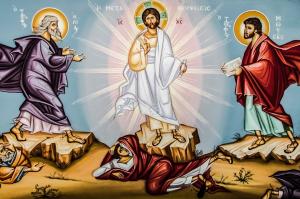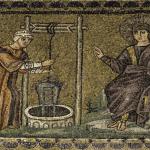
The divine nature’s transcendence leads to all kinds of paradoxes for us when we try to apprehend the truth of God. The complications which arise when a five-dimensional object is apprehended in a two-dimensional manner is far less than those which arise when the absolutely, and therefore infinitely, transcendent divinity is approached by us. God is great and yet simple. God is eternal, beyond time and space, and yet interacts with the those contained in time and space. We do not know what God is but we know that God is. Because of divine simplicity, God’s existence must be one with and not other than God’s nature. How, if God’s nature is one with God’s existence, can we know God is, if we do not know what God is? How do we know what God is like, how can we characterize God as good, just, merciful, or loving if God is incomprehensible to us?
If is as if there is a darkness which surrounds the essence of God. However, because God is light, and nothing of the darkness is contained within that light, it must not be understood as a real darkness; rather, it is supra-illuminous light, one which is beyond our ability to apprehend. That brightness appears to us as if it were a darkness similar to the way one who stares into the sun will find the sun will overcome their sight, blinding them from its intensity. God, nonetheless, condescends to reach toward us and reveal the light of truth in forms which we can apprehend. We observe the light which is God, not in its fullness, but as it empties itself of its intensity, allowing us, therefore, to perceive the light of the glory of God.
Thus, we can see and experience the light of God even if the light, as it is in itself, transcends our ability to even perceive it. It truly is God whom experience when we experience that light, the light which was seen on Tabor. We can partake of that light, indeed, embrace it for ourselves, so that in and through it, the light which shines in the darkness shines in and through us, deifying us and making us gods by grace:
Let no one deceive you! God is light (1 John 1:5), and to those who have entered into union with Him He imparts of Hid own brightness and to the extent that they have been purified. When the lamp of the soul that is the mind, has been kindled, then it knows that a divine fire has taken hold of it and inflamed it. How great a marvel! Man is united to God spiritually and physically, since the soul is not separated from the mind, neither the body from the soul. Being united in essence man has three hypostases by grace. He is a single godly adoption with body and soul and the divine Spirit, of whom he has become a partaker. [1]
Our engagement with God is spiritual, but it is also physical; our union with God takes place in and with the body and not apart from it. God is with us. The divine glory is revealed in and through us as that light shines in and through us. It lifts us up, imparting grace upon us, making us God-like insofar as we unite ourselves with it.
The glory of the Transfigured Christ, the light which the apostles saw, was not a mere apparition, but rather, it was the light of glory as it was seen and manifested itself in and through Christ’s body. We can, therefore, see the glory of God, not only in the God-man, but also in and through those who so unite themselves with God’s grace. Moses, long before the Transfiguration, had to veil himself because of the way he had united himself with God’s deifying grace, for it is said that those who saw and encountered him saw the bright light shining through him, blinding them when they looked directly upon him. The veil did not take away the glory but only limited the way others apprehended it. Likewise, those who are not accustomed to the light, those not so far advanced in their interaction with God, are met by God through veils, veils which God condescends to use so that we can approach the divine glory and receive a share of it for ourselves. Then, the more we partake of it, the more it will purify, illumine, and perfect us, allowing us to partake of more and more of it, seeing more and more of the glory of God as we encounter God in and through greater manifestations of that glory.[2]
We, therefore, see one of the great paradoxes which come from God’s transcendence God is a light, a light so bright that it is as if were a bright darkness. Likewise, God is a spirit, so the light is a spiritual light; when it is not mediated, it is not discernable in and through the empirical senses, for they only perceive what is physical. Yet, because the spiritual light joins in with those who are at once spiritual and physical, the spiritual light can be discerned through a physical manifestation; the manifestation in the flesh reveals the work of that spiritual light upon the flesh. What is seen is truly that spiritual light, but it is not the spiritual light in its spiritual transcendence, that is in accordance with its nature, but rather in its economic activity which allows it to unite itself with the physical world. The light of God, the light which is God, is so great that nothing can comprehend it, but it is so great, likewise, it condescends in its greatness to reach towards us and be encountered by us in forms which we can apprehend.
Thus, St. Cyril of Jerusalem, tells us we can approach the divine nature through God’s works as the vestiges of God’s activities can be found throughout creation. Everything speaks of God and reveals something of God to us. As all things are the work of God, in all things the glory of God can be found. Through all created beings, therefore, we can find analogies which hint at and reveal truths about God, and so through them, we can rise up and apprehend God with greater and greater apprehensions, gaining loftier and loftier concepts of God:
It is impossible, then, to perceive the Divine Nature with bodily eyes; but from His divine works we may gain some impression of His power, according to the words of Solomon: “For from the greatness and the beauty of created things their original author, by analogy, is seen.” Now he did not say that from created things the creator is seen, but he added “by analogy.” For so much the greater does God seem to each man, as the man achieves a loftier concept of creatures; and when by deeper contemplation he has elevated his heart, he gains a loftier concept of God. [3]
We begin our apprehension of God in and through the light of God’s work as it is contained in creation itself. We must observe creation with a desire to see God’s glory in it. We should contemplate the goodness contained in all things because all things are made by a good and loving God. In doing so, we begin to perceive the share of God’s glory given to them. This why it is important that we look at creation, not with an attempt to lower it and its worth, but to elevate it, for the more we do so, the loftier our vision of God can and will be. This is because the more we perceive the greatness found in creation, the better we will be able to appreciate how great God must be.
[1] St. Symeon the New Theologian, The Discourses. Trans. George Malone SJ (New York: Paulist Press, 1980), 195.
[2] This is also true in relation to the way we view and understand the God-man, so that some will experience him more or less through his humanity, while others, while still seeing and interacting with him in his humanity will see the divine glory shining in and through it.
[3] St. Cyril of Jerusalem, Procatechesis and Catechesis 1-12. Trans. Leo P. McCauley, SJ and Anthony A Stephenson (Washington, DC: CUA Press, 1969), 186 [Catechesis IX].
Stay in touch! Like A Little Bit of Nothing on Facebook.
If you liked what you read, please consider sharing it with your friends and family!













